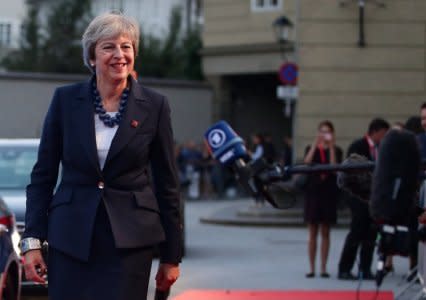In Brexit bid, Britain's May pledges to help EU tackle people smugglers

Thomson Reuters
SALZBURG, Austria (Reuters) - Prime Minister Theresa May will call on other EU leaders on Wednesday to work together with Britain to drive people smugglers off social media, a sign of her hopes for future cooperation after Brexit.
Over what has become a key dinner in Austria for her plans to leave the European Union, May will also try to underline what Britain can still bring to the bloc, long after it leaves in March next year after almost half a century of the closest ties.
With just over six months until Britain leaves, May is trying to seal a deal before the end of the year and has long seen current security and justice cooperation as one of her strongest cards to try to win a favorable future trade deal.
Speaking to the other EU leaders at a summit in Salzburg, May will say the lessons that Britain and its partners have learned in tackling online radicalization should now be applied to illegal migration.
She will describe migration as a "generational challenge", her office said, and that, post-Brexit, Britain will remain fully committed to playing its part.
Migration has become a major test for the EU, which has struggled to agree a common stance on how to deal with the arrival of migrants from the Middle East and Africa onto its Mediterranean shores.
May will say it is too easy for traffickers and smugglers to advertise their services online, and will set out how Britain has referred 539 social media pages advertising people smuggling services for closure by Europol in the last year.
She will offer to share British expertise and put Britain at the forefront of a combined effort to work with social media platforms to prevent criminals exploiting their networks.
(Reporting by Elizabeth Piper; Editing by Hugh Lawson)
See Also:

 Yahoo News
Yahoo News 
